My Brexit box: The people stockpiling food
- Published
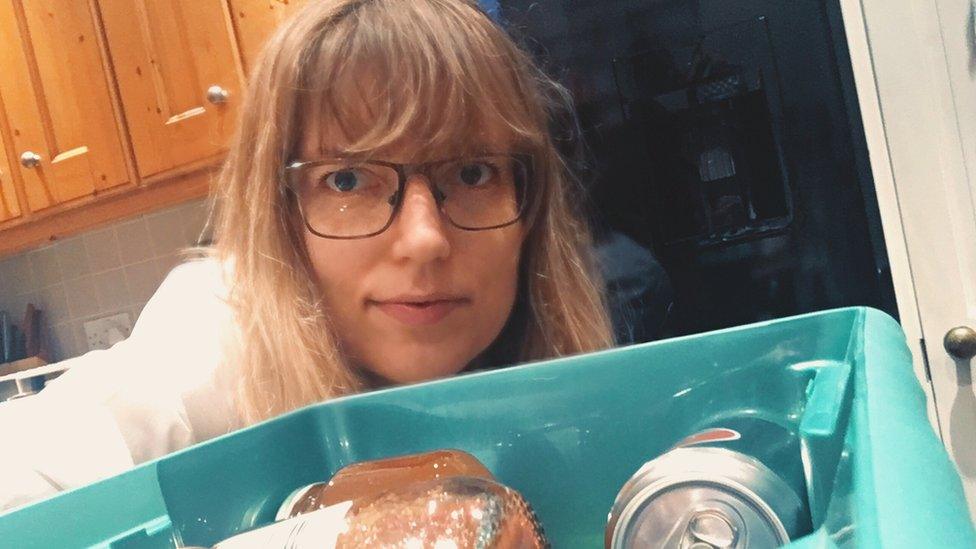
Justyna Kowalczyk says the "Brexit box" was her partner's idea
"It might sound a bit crazy," admits Justyna Kowalczyk.
She's talking about her "Brexit box" tucked under the kitchen table.
In the plastic container, which is around the same size as a small box of photocopier paper, she has bottles of tonic water, coffee and French marmalade. Away from the kitchen, in a cupboard she has stored extra bottles of shampoo.
They're hardly essentials for daily living but they're all made in the European Union and Justyna says she's simply making sure she'll still be able to have her favourite products in the immediate aftermath of Brexit.
The box was her partner's idea.
"It wasn't like one day we decided Brexit is coming, it was more of a process than a one-off decision."
She says she's joked about it with her friends, but not everyone has found her box so crazy. "Everyone thinks about it a little bit... everyone is a bit nervous," she says.
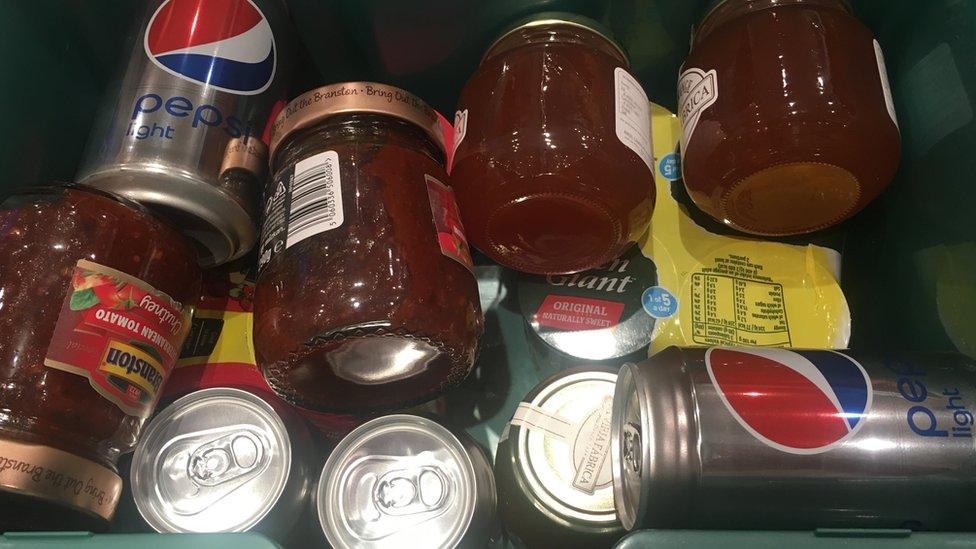
Jars of marmalade and coffee are stored in Justyna's Brexit box
The idea that we might not be able to shop as normal in the immediate aftermath of Brexit seems ludicrous. When I asked on Twitter if anyone was putting aside goods, I was accused of scaremongering. "What a ridiculous tweet, do people actually think we're going back to the stone age immediately after Brexit?" was one scathing response.
A spokesperson for the Department for Exiting the European Union is unequivocal people shouldn't be concerned, saying that the government is preparing for all eventualities but had no plans to stockpile food and people should not do so either.
"The UK has a strong level of food security built upon a diverse range of sources including strong domestic production and imports from third countries. This will continue to be the case whether we leave the EU with or without a deal."
Industry body the British Retail Consortium says there is no evidence of any widespread stockpiling of food. I asked the four major supermarkets as well as Aldi and Lidl whether they had seen any evidence, but none of them responded.
But according to food research charity IGD, 2% of shoppers in a survey of 1,700 people last month said they had started to stock up on food supplies.
Last month, the New York Times ran a front-page story on "the British hoarders" preparing for Brexit, external.
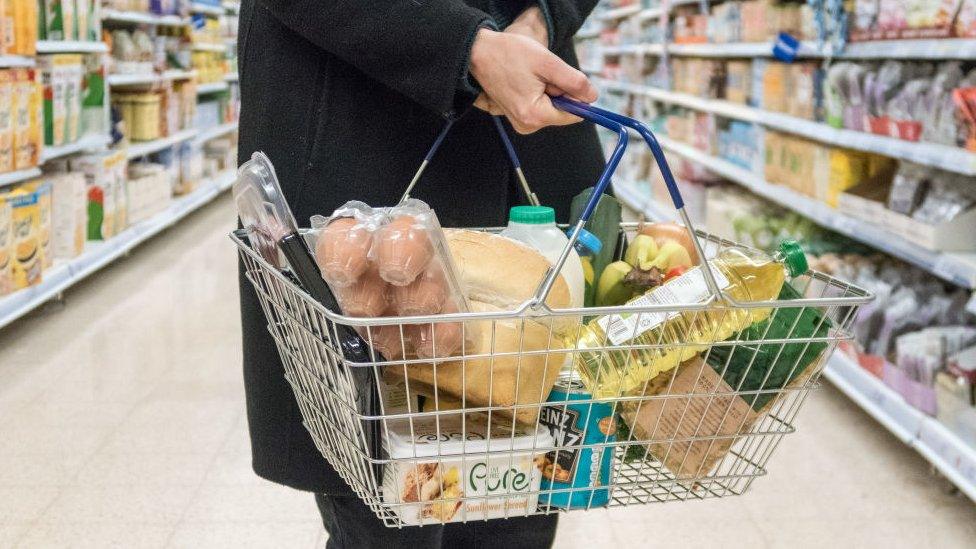
The government says it has no plans to stockpile food and people should not do so either
A Facebook group called the 48% Preppers, named after the proportion of people who voted to remain in the EU in the 2016 referendum, suggests stockpiling more everyday items. In the group, which has around 1,600 members, a 16-page leaflet called Getting Ready Together, external is being circulated.
It advises keeping at home extra non-perishable items, which can be prepared quickly and require little water. Suggestions include potatoes, eggs, carrots, crackers, cheese, milk powder, grains and instant mash. Tinned fish and soup also feature as well as tea and coffee.
If the name didn't give it away, the group makes no secret of the fact that it thinks Brexit will be bad, "possibly even disastrous" for the UK and acknowledges its advice is based on this assumption.
But are people right to be worried about the availability of certain foods when the UK leaves the EU?
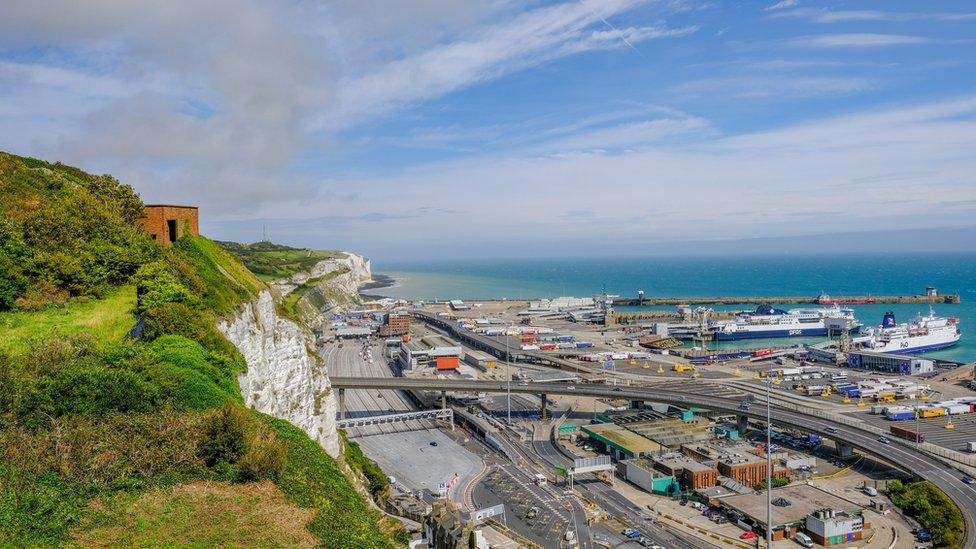
KPMG says 290 trucks come through Dover each day just supplying citrus fruits
As a country we're currently heavily reliant on imports. In fact, just half of the food we eat in the UK originates here, with most of the rest imported from Europe, including almost all our fresh fruit and many of our vegetables.
Brexit Secretary Dominic Raab said this week: "I don't think it's a question so much of the risk of major shortages but I think probably the average consumer might not be aware of the full extent to which the choice of goods that we have in the stores are dependent on one or two very specific trade routes."
Mr Raab also admitted that even he "hadn't quite understood" how reliant UK trade in goods is on the Dover-Calais crossing, which is vital for trade with Europe.
Fresh food - which cannot be stockpiled - is the biggest concern. A vegetable shortage last year, driven by bad weather in southern Europe, highlighted this dependence, and led to a flurry of pictures on social media of empty supermarket shelves.
Dave Lewis, the chief executive of the UK's largest supermarket Tesco, warned on this last month.
"The biggest single challenge will be in a no-deal scenario, will be what happens with fresh food," he said.
"It's all about product flow [over borders]. The possibility of stockpiling fresh food is very, very limited."
Just in time
The UK's supply chains work on a "just in time" basis, meaning stock is delivered daily, not stored for long periods in warehouses.
Mr Lewis said in the lead-up to Brexit that Tesco was focusing on how to ensure movements of fresh food were not held up.
He added that the retailer was looking at stockpiling grocery products, with contingency planning stepping up after Christmas if a deal is still not struck.
To illustrate the complexity, Paul Martin, UK head of retail at consultancy KPMG, says 290 trucks come through Dover each day just supplying citrus fruits. He says any level of disruption, such as trucks needing to pass extra inspections, is likely to have an impact.
"If we have a no-deal scenario, if there is disruption, then certain products will not be available for a certain period of time," he says.
He is, however, certain that any supply shortage would be only temporary "because it's in the interests of all parties to get the supply chain as close to normal as quickly as possible".
Trying to fly in produce from elsewhere is a possibility, but this would cost more, and it's unlikely other countries would have the stock in sufficient volume to make up the shortfall, he says.
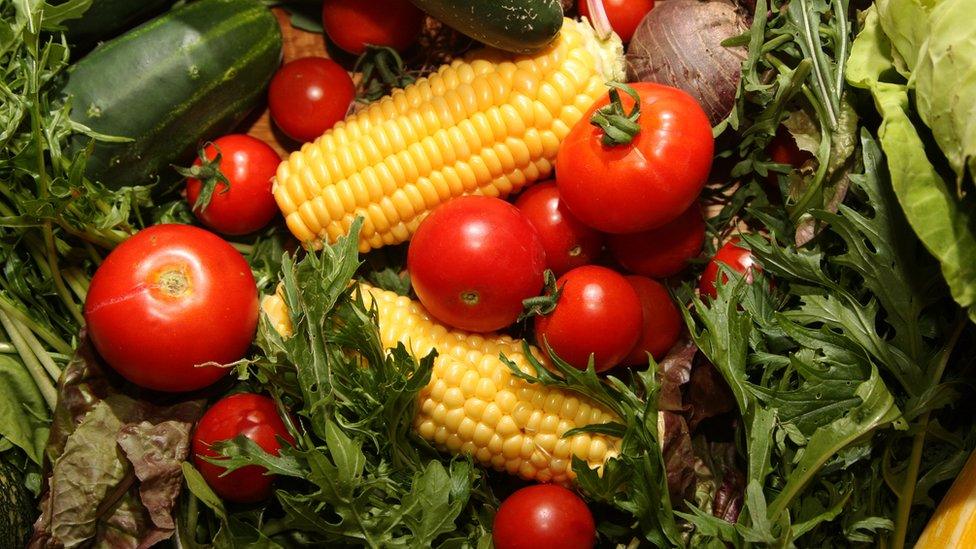
It's not possible to stock up on fresh goods such as tomatoes and spinach
Meanwhile, limited free warehousing space, particularly refrigerated space, in the country means supermarkets stockpiling goods themselves isn't practical on a large scale.
One cold storage firm, Wild Water, has already warned it has run out of room due to the food industry stockpiling in the run-up to Brexit.
And stocking up on fresh food simply isn't possible, says Catherine Shuttleworth, shopping and retail expert at agency Savvy.
"Supermarkets might be able to stockpile tins, but not milk, cheese and fresh fruit. These are the things we buy every day as a nation," she says.
She warns if food supplies are affected by Brexit, supermarkets are likely to raise prices to try and slow demand.
Prof Tim Benton, an expert in food systems from the University of Leeds, also thinks if the EU and the UK fail to reach agreement on the terms of departure then there could be "significant interruptions to food supplies".
"If disruption were to continue for more than a week almost any food might start becoming difficult to get," he says.
As a result, he believes that it makes "some degree of sense" not to assume food supplies will be available as normal if significant structural changes to customs regimes at borders are likely.
Nevertheless, all official bodies advise against stockpiling, with the British Retail Consortium saying it's "not a practical response to a no-deal on Brexit".
Justyna is not deterred though. "I just want to make sure I have my favourite things," she says.
- Published9 November 2018
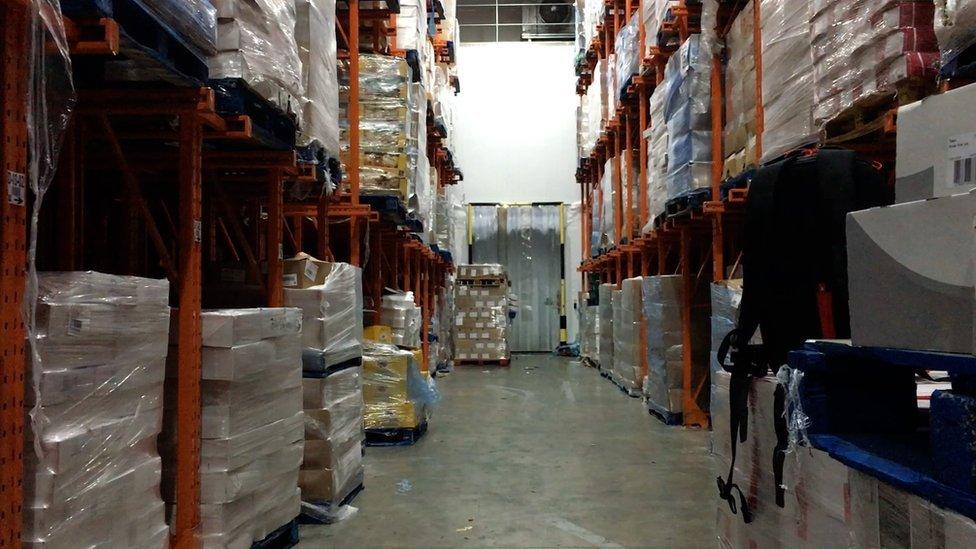
- Published19 October 2018

- Published3 August 2018
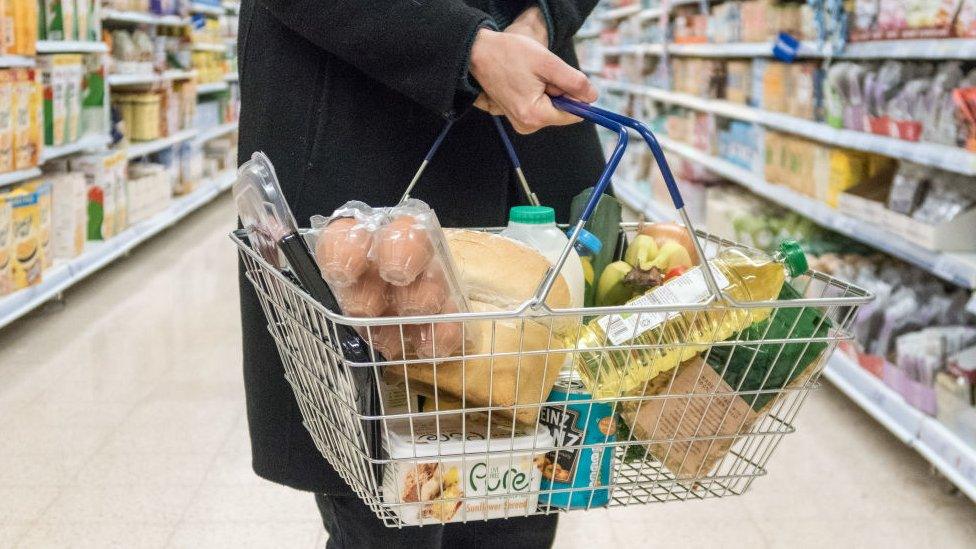
- Published22 February 2017
